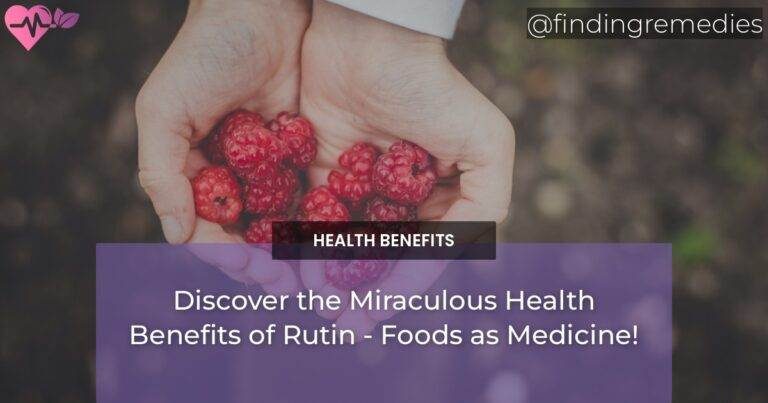Rutin is a bioflavonoid, a natural compound found in many plants. It has numerous health benefits and is famous for its antioxidant and anti-inflammatory properties. In this article, we will explore the various health benefits of rutin, its sources, and possible side effects.
Table of Contents
What is Rutin?
Rutin is a flavonoid, a type of compound that occurs naturally in many plants. Rutin is present in foods such as apples, onions, citrus fruits, buckwheat, and tea. It is also available in supplement form. Rutin has been used for centuries in traditional medicine to treat a variety of ailments.
Types and Sources of Rutin
Rutin is a flavonoid antioxidant that is found in a variety of foods. It is especially abundant in the following sources:
Buckwheat – Buckwheat is one of the richest sources of rutin. The hulls of buckwheat seeds contain high concentrations. Rutin makes up nearly 10% of the dry weight of buckwheat hulls.
Citrus Fruits – The peels and rinds of citrus fruits, including oranges, grapefruit, lemons and limes, have significant amounts of rutin. The juice contains lower levels.
Apples – Apple peels contain high levels of rutin and other flavonoids. Make sure to eat the skins to get the benefits.
Onions – Yellow onions are particularly high in rutin compared to other onion varieties. Shallots also contain moderate amounts.
Berries – Many berries provide rutin as well as other antioxidant polyphenols. Good sources include blackberries, raspberries, cranberries and elderberries.
Tea – Both black and green teas have rutin. Green tea tends to be higher in flavonoids than black tea. Herbal teas made with buckwheat hulls are very high in rutin.
Asparagus – This spring vegetable is a lesser known but potent source of rutin.
Other Foods – Smaller amounts are found in prunes, apricots, cherries, peaches, broccoli, parsley, dill, fennel and even dark chocolate.
Supplements – Rutin capsules and tablets provide concentrated amounts of the flavonoid. Supplements typically contain 500 mg per dose.
The highest quantities of rutin come from buckwheat, citrus peels, apples and onions. Consuming these foods, along with other rutin-rich produce, herbs and teas, can help maximize dietary intake. Supplements also provide a convenient way to increase consumption.
Health Benefits of Rutin
Anti-inflammatory and Anti-allergic Properties
Rutin has potent anti-inflammatory and anti-allergic properties. It helps to reduce inflammation by inhibiting the production of inflammatory cytokines. Rutin has been shown to be effective in reducing the symptoms of allergic rhinitis, asthma, and eczema.
Antioxidant and Cytoprotective Effects
Rutin is a powerful antioxidant that helps to protect cells from oxidative stress. It also has cytoprotective effects, which means that it helps to protect cells from damage caused by toxins and other harmful substances.
Anti-cancer Properties
Rutin has been shown to have anti-cancer properties. It has been found to inhibit the growth of cancer cells in vitro and in animal studies. Rutin has also been shown to enhance the effects of chemotherapy drugs.
Anti-diabetic Properties
Rutin has been shown to have anti-diabetic properties. It helps to reduce blood sugar levels by increasing insulin secretion and improving insulin sensitivity. Rutin also helps to reduce the risk of diabetic complications such as neuropathy and retinopathy.
Cardiovascular Health Benefits
Rutin has numerous cardiovascular health benefits. It helps to improve blood vessel health and capillary strength. Rutin also helps to reduce the risk of heart disease by reducing cholesterol levels and improving blood flow. It also helps to prevent blood clots.
Safety and Risk Factors
Possible Side Effects
Rutin is generally safe when taken in recommended doses. However, some people may experience side effects such as headaches, stomach upset, and dizziness.
Interactions with Medications
Rutin may interact with certain medications, including blood thinners and antibiotics. If you are taking any medications, it is essential to consult your doctor before taking rutin supplements.
Precautions during Pregnancy and Breastfeeding
There is insufficient evidence on the safety of rutin supplements during pregnancy and breastfeeding. It is best to avoid taking rutin supplements during these periods.
Summary of Health Benefits of Rutin
Rutin is a bioflavonoid that has numerous health benefits. It has anti-inflammatory, antioxidant, anti-cancer, anti-diabetic, and cardiovascular health benefits. Rutin has shown to be effective in treating a variety of conditions, including allergies, cancer, diabetes, and heart disease. However, it is essential to consult your doctor before taking rutin supplements, especially if you are taking any medications.
How does rutin’s antioxidant capacity compare to other flavonoids?
Rutin is considered one of the most potent antioxidant flavonoids. In research studies, rutin consistently demonstrates high free radical scavenging activity and ability to prevent oxidative damage. Its antioxidant capacity ranks among the highest compared to related compounds like quercetin, hesperidin, naringenin, and catechin. Overall, rutin’s antioxidant effects are strong and well-documented.
Can rutin improve brain function and cognition?
Emerging research shows rutin may have neuroprotective and nootropic effects. Rutin is able to cross the blood-brain barrier where it can increase cerebral blood flow, boost BDNF, and stimulate neural growth and connectivity. Animal studies demonstrate rutin’s ability to enhance memory and learning capabilities. More human data is still needed, but the early evidence is promising for rutin as a brain-boosting flavonoid.
Does cooking affect rutin content in food?
Yes, the rutin content in foods decreases significantly with cooking. Heat exposure causes degradation of the rutin molecules. For example, cooking buckwheat reduces its rutin content by 10-30%. To maximize rutin intake, it is best to consume high-rutin foods raw or with minimal processing. Cooking times should be kept short. Steaming or microwaving helps retain more rutin compared to boiling.
Does rutin interact with any medications?
Yes, there are some important medication interactions to be aware of. Rutin can enhance the effects of anticoagulant and anti-platelet drugs, increasing bleeding risk. It may also negatively interact with certain antibiotics, chemotherapy drugs, and medications metabolized by CYP enzymes. Anyone on prescription medications should consult a doctor before taking supplemental rutin.

